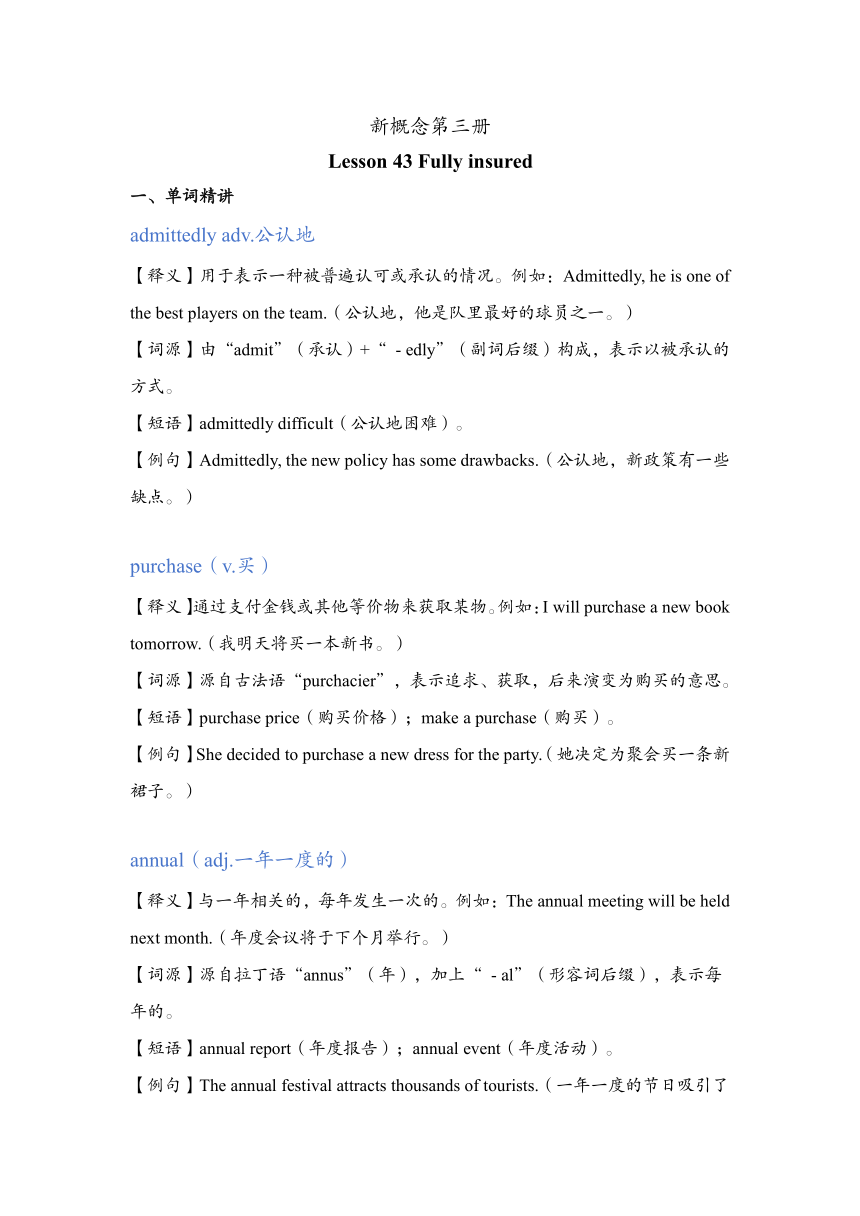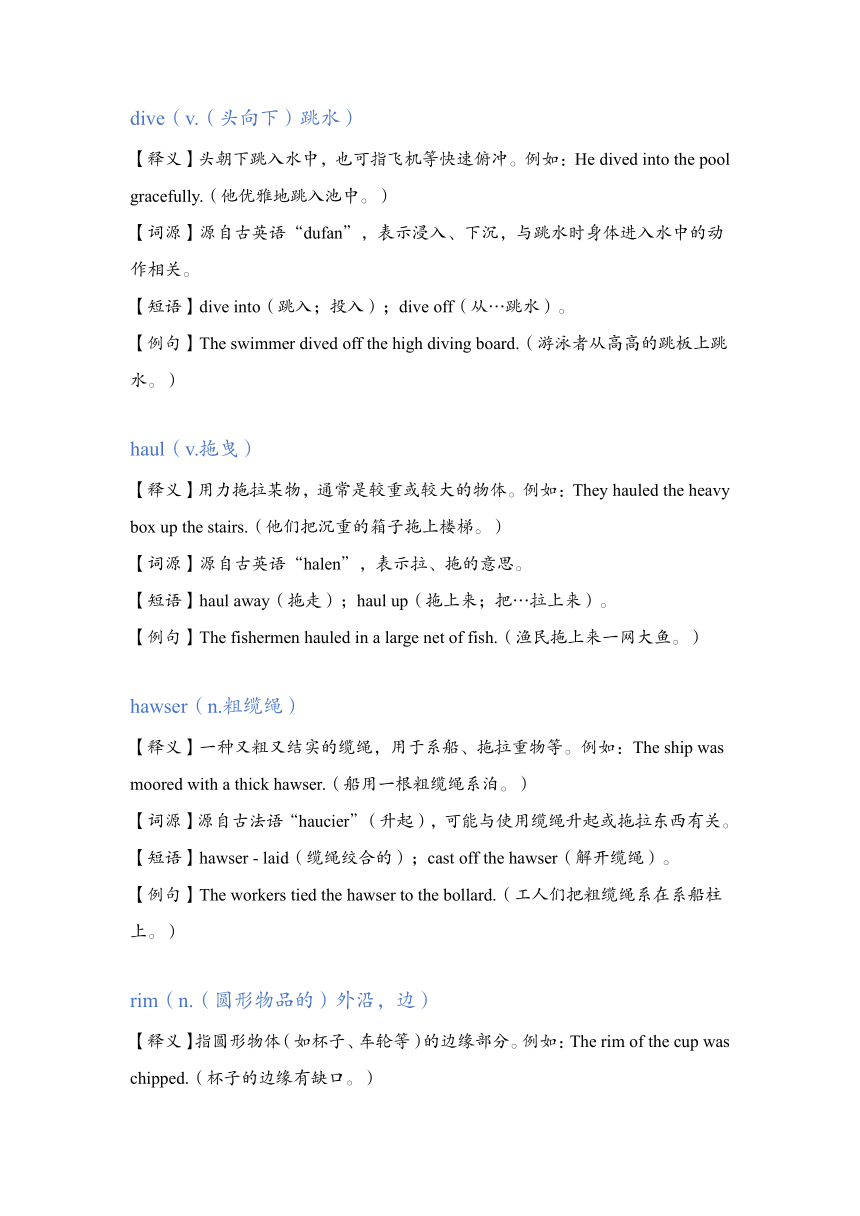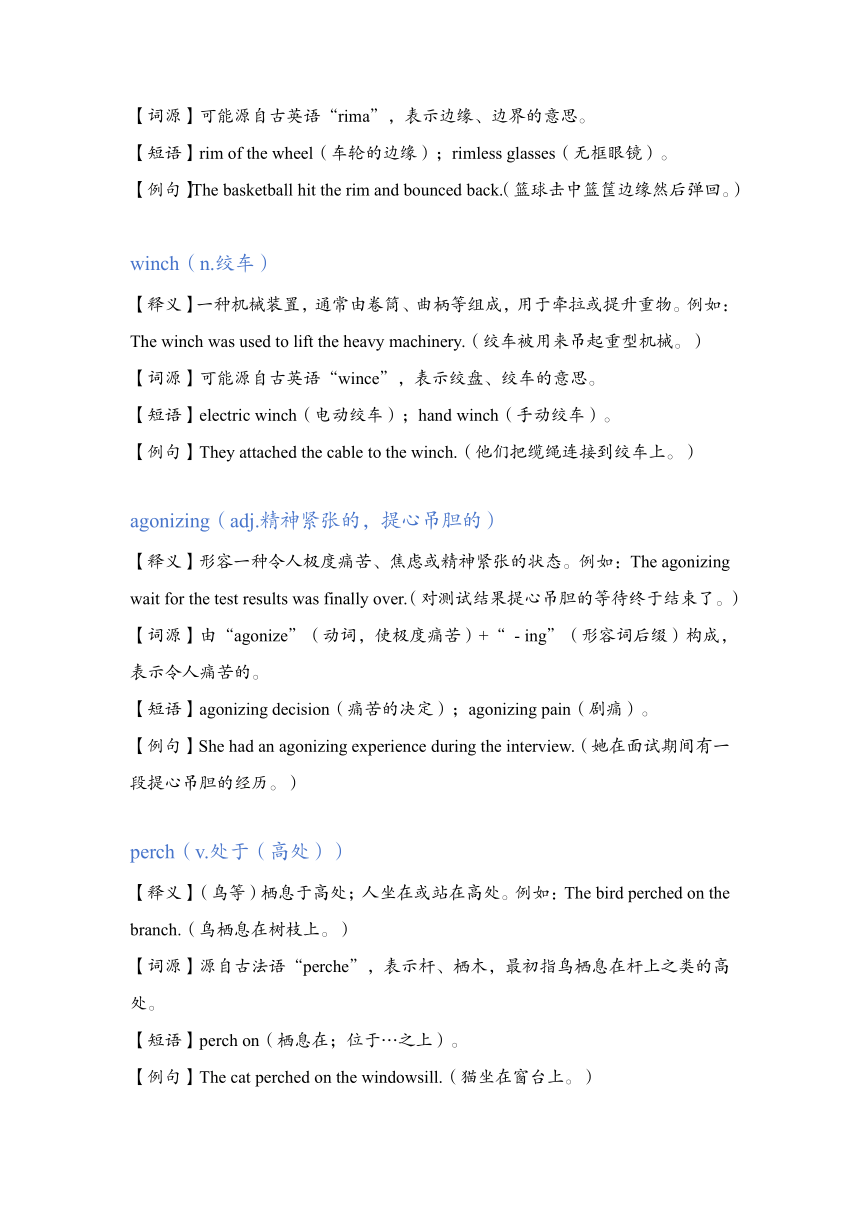新概念第三册Lesson 43 Fully insured讲义
文档属性
| 名称 | 新概念第三册Lesson 43 Fully insured讲义 |  | |
| 格式 | docx | ||
| 文件大小 | 279.8KB | ||
| 资源类型 | 教案 | ||
| 版本资源 | 新概念英语 | ||
| 科目 | 英语 | ||
| 更新时间 | 2024-12-05 10:50:24 | ||
图片预览




文档简介
新概念第三册
Lesson 43 Fully insured
单词精讲
admittedly adv.公认地
【释义】用于表示一种被普遍认可或承认的情况。例如:Admittedly, he is one of the best players on the team.(公认地,他是队里最好的球员之一。)
【词源】由“admit”(承认)+“ - edly”(副词后缀)构成,表示以被承认的方式。
【短语】admittedly difficult(公认地困难)。
【例句】Admittedly, the new policy has some drawbacks.(公认地,新政策有一些缺点。)
purchase(v.买)
【释义】通过支付金钱或其他等价物来获取某物。例如:I will purchase a new book tomorrow.(我明天将买一本新书。)
【词源】源自古法语“purchacier”,表示追求、获取,后来演变为购买的意思。
【短语】purchase price(购买价格);make a purchase(购买)。
【例句】She decided to purchase a new dress for the party.(她决定为聚会买一条新裙子。)
annual(adj.一年一度的)
【释义】与一年相关的,每年发生一次的。例如:The annual meeting will be held next month.(年度会议将于下个月举行。)
【词源】源自拉丁语“annus”(年),加上“ - al”(形容词后缀),表示每年的。
【短语】annual report(年度报告);annual event(年度活动)。
【例句】The annual festival attracts thousands of tourists.(一年一度的节日吸引了成千上万的游客。)
teenager(n.(13至19岁的)青少年)
【释义】指年龄在13到19岁之间的年轻人,处于少年和青年之间的阶段。例如:Most teenagers like listening to pop music.(大多数青少年喜欢听流行音乐。)
【词源】“teen”(表示13 - 19中的数字结尾)+“ager”(表示人的后缀),组合起来表示这个年龄段的人。
【短语】teenage years(青少年时期);teenager problems(青少年问题)。
【例句】Some teenagers are rebellious.(一些青少年很叛逆。)
capsize(v.(船)翻)
【释义】(指船)翻转,使船底朝上。例如:The strong wind capsized the small boat.(强风使小船翻了。)
【词源】可能源自西班牙语“capuzar”,表示使船头朝下。
【短语】be capsized by(被…弄翻)。
【例句】The rough waves capsized several boats.(汹涌的海浪掀翻了几艘船。)
shiver(v.打颤,发抖)
【释义】因寒冷、恐惧或激动等而身体轻微颤抖。例如:She shivered in the cold wind.(她在寒风中发抖。)
【词源】可能源自古英语“sciferian”,表示分裂、破碎,与颤抖时身体的感觉类似。
【短语】shiver with(因…而发抖)。
【例句】The little boy shivered with fear when he saw the big dog.(小男孩看到大狗时吓得发抖。)
dive(v.(头向下)跳水)
【释义】头朝下跳入水中,也可指飞机等快速俯冲。例如:He dived into the pool gracefully.(他优雅地跳入池中。)
【词源】源自古英语“dufan”,表示浸入、下沉,与跳水时身体进入水中的动作相关。
【短语】dive into(跳入;投入);dive off(从…跳水)。
【例句】The swimmer dived off the high diving board.(游泳者从高高的跳板上跳水。)
haul(v.拖曳)
【释义】用力拖拉某物,通常是较重或较大的物体。例如:They hauled the heavy box up the stairs.(他们把沉重的箱子拖上楼梯。)
【词源】源自古英语“halen”,表示拉、拖的意思。
【短语】haul away(拖走);haul up(拖上来;把…拉上来)。
【例句】The fishermen hauled in a large net of fish.(渔民拖上来一网大鱼。)
hawser(n.粗缆绳)
【释义】一种又粗又结实的缆绳,用于系船、拖拉重物等。例如:The ship was moored with a thick hawser.(船用一根粗缆绳系泊。)
【词源】源自古法语“haucier”(升起),可能与使用缆绳升起或拖拉东西有关。
【短语】hawser - laid(缆绳绞合的);cast off the hawser(解开缆绳)。
【例句】The workers tied the hawser to the bollard.(工人们把粗缆绳系在系船柱上。)
rim(n.(圆形物品的)外沿,边)
【释义】指圆形物体(如杯子、车轮等)的边缘部分。例如:The rim of the cup was chipped.(杯子的边缘有缺口。)
【词源】可能源自古英语“rima”,表示边缘、边界的意思。
【短语】rim of the wheel(车轮的边缘);rimless glasses(无框眼镜)。
【例句】The basketball hit the rim and bounced back.(篮球击中篮筐边缘然后弹回。)
winch(n.绞车)
【释义】一种机械装置,通常由卷筒、曲柄等组成,用于牵拉或提升重物。例如:The winch was used to lift the heavy machinery.(绞车被用来吊起重型机械。)
【词源】可能源自古英语“wince”,表示绞盘、绞车的意思。
【短语】electric winch(电动绞车);hand winch(手动绞车)。
【例句】They attached the cable to the winch.(他们把缆绳连接到绞车上。)
agonizing(adj.精神紧张的,提心吊胆的)
【释义】形容一种令人极度痛苦、焦虑或精神紧张的状态。例如:The agonizing wait for the test results was finally over.(对测试结果提心吊胆的等待终于结束了。)
【词源】由“agonize”(动词,使极度痛苦)+“ - ing”(形容词后缀)构成,表示令人痛苦的。
【短语】agonizing decision(痛苦的决定);agonizing pain(剧痛)。
【例句】She had an agonizing experience during the interview.(她在面试期间有一段提心吊胆的经历。)
perch(v.处于(高处))
【释义】(鸟等)栖息于高处;人坐在或站在高处。例如:The bird perched on the branch.(鸟栖息在树枝上。)
【词源】源自古法语“perche”,表示杆、栖木,最初指鸟栖息在杆上之类的高处。
【短语】perch on(栖息在;位于…之上)。
【例句】The cat perched on the windowsill.(猫坐在窗台上。)
precariously(adv.危险地,不稳固地)
【释义】以一种不安全、不稳定、充满危险的方式。例如:The ladder was leaning precariously against the wall.(梯子危险地靠在墙上。)
【词源】由“precarious”(形容词,不稳定的、危险的)+“ - ly”(副词后缀)构成,表示不稳定地。
【短语】precariously balanced(危险地平衡着)。
【例句】He was precariously perched on the edge of the cliff.(他危险地坐在悬崖边缘。)
overbalance(v.失去平衡)
【释义】因失去稳定而倾倒或摔倒,失去平衡状态。例如:He overbalanced and fell into the pool.(他失去平衡掉进了游泳池。)
【词源】由“over - ”(过度)+“balance”(平衡)构成,表示平衡过度而失去平衡。
【短语】overbalance oneself(使自己失去平衡)。
【例句】The sudden movement made her overbalance.(突然的移动使她失去平衡。)
clamp(n.夹钳,夹板)
【释义】一种用于夹紧、固定物体的工具,通常由两个可活动的部分组成。例如:The mechanic used a clamp to hold the parts together.(机械师用夹钳把零件固定在一起。)
【词源】可能源自古英语“clam”,表示紧握、夹紧的东西。
【短语】clamp down(取缔;施加压力);clamp on(夹上;强加)。
【例句】He tightened the clamp to keep the wood in place.(他拧紧夹钳以固定木材。)
vertically(adv.垂直地)
【释义】与垂直方向有关,呈垂直状态地。例如:The pole stands vertically on the ground.(杆子垂直地立在地上。)
【词源】由“vertical”(形容词,垂直的)+“ - ly”(副词后缀)构成,表示垂直地。
【短语】ertically aligned(垂直对齐的)。
【例句】The wall was built vertically.(墙是垂直建造的。)
torrent(n.激流,洪流)
【释义】指快速流动的大量的水(如河流中的急流部分),也可比喻大量快速涌出的事物。例如:The torrent swept away the bridge.(激流冲走了桥。)
【词源】源自拉丁语“torrere”(烤干、烧焦),可能与激流的汹涌、强大能带来类似烤干(冲走一切)的效果有关。
【短语】a torrent of(大量的…;一连串的…);mountain torrent(山洪)。
【例句】A torrent of words came out of his mouth.(他滔滔不绝地说了一大串话。)
rebound(v.弹回)
【释义】(球等)撞击某物后弹回;也可指从不好的情况中恢复。例如:The ball rebounded off the wall.(球从墙上弹回。)
【词源】由“re - ”(回)+“bound”(跳跃、弹起)构成,表示弹回。
【短语】rebound from(从…中恢复;从…反弹)。
【例句】The economy is starting to rebound after the recession.(经济在衰退后开始复苏。)
二、课文精讲
1.Insurance companies are normally willing to insure anything.保险公司一般说来愿意承保一切东西。
be willing to do的意思是“愿意做”。
2.Insuring public or private property is a standard practice in most countries in the world.承办公共财产或私人财产保险是世界上大部分国家的正常业务。
sth.is standard practice的意思是“某事是正常业务”。
3.If, however, you were holding an open air garden party or a fete it would be equally possible to insure yourself in the event of bad weather.如果你要举办一次露天游园会或盛宴,为避免碰上不好的天气而遭受损失也同样可以保险。
if引导虚拟语气的句子。
4.Needless to say, the bigger the risk an insurance company takes,the higher the premium you will have to pay.不用说,保险公司承担风险越大,你付的保险费也就越高。
the bigger…the higher…即“the+more…the+more…”结构,表示“越…越…”。
5.It is not uncommon to hear that a ship ping company has made a claim for the cost of salvaging a sunken ship.航运公司为打捞沉船而提出索赔,这是常有的事。
make a claim for的意思是“为…而提出索赔”。
6.But the claim made by a local authority to recover the cost of salvaging a sunken pie dish must surely be unique.但某地当局为打捞一只焙制馅饼的盘子提出索赔,倒是件新鲜的事儿。
sth.must surely be unique=sth.must surely be exceptional,这个句子结构值得大家品味和学习。
7.It had been purchased by a local authority so that an enormous pie could be baked for an annual fair.某地方当局买下它用来焙制一个巨大的馅饼为一年一度交易会助兴。
so that引导目的状语从句。
8. The men were now obliged to try once more.工人们只得再来一次。
be obliged to的意思是“不得不(做)”。
9.By working at tremendous speed, the men managed to get the dish on to dry land before the wave returned.工人们动作迅速,终于赶在那股大浪返回之前把盘子拽到了岸上。
manage to do的意思是“设法做”。
Lesson 43 Fully insured
单词精讲
admittedly adv.公认地
【释义】用于表示一种被普遍认可或承认的情况。例如:Admittedly, he is one of the best players on the team.(公认地,他是队里最好的球员之一。)
【词源】由“admit”(承认)+“ - edly”(副词后缀)构成,表示以被承认的方式。
【短语】admittedly difficult(公认地困难)。
【例句】Admittedly, the new policy has some drawbacks.(公认地,新政策有一些缺点。)
purchase(v.买)
【释义】通过支付金钱或其他等价物来获取某物。例如:I will purchase a new book tomorrow.(我明天将买一本新书。)
【词源】源自古法语“purchacier”,表示追求、获取,后来演变为购买的意思。
【短语】purchase price(购买价格);make a purchase(购买)。
【例句】She decided to purchase a new dress for the party.(她决定为聚会买一条新裙子。)
annual(adj.一年一度的)
【释义】与一年相关的,每年发生一次的。例如:The annual meeting will be held next month.(年度会议将于下个月举行。)
【词源】源自拉丁语“annus”(年),加上“ - al”(形容词后缀),表示每年的。
【短语】annual report(年度报告);annual event(年度活动)。
【例句】The annual festival attracts thousands of tourists.(一年一度的节日吸引了成千上万的游客。)
teenager(n.(13至19岁的)青少年)
【释义】指年龄在13到19岁之间的年轻人,处于少年和青年之间的阶段。例如:Most teenagers like listening to pop music.(大多数青少年喜欢听流行音乐。)
【词源】“teen”(表示13 - 19中的数字结尾)+“ager”(表示人的后缀),组合起来表示这个年龄段的人。
【短语】teenage years(青少年时期);teenager problems(青少年问题)。
【例句】Some teenagers are rebellious.(一些青少年很叛逆。)
capsize(v.(船)翻)
【释义】(指船)翻转,使船底朝上。例如:The strong wind capsized the small boat.(强风使小船翻了。)
【词源】可能源自西班牙语“capuzar”,表示使船头朝下。
【短语】be capsized by(被…弄翻)。
【例句】The rough waves capsized several boats.(汹涌的海浪掀翻了几艘船。)
shiver(v.打颤,发抖)
【释义】因寒冷、恐惧或激动等而身体轻微颤抖。例如:She shivered in the cold wind.(她在寒风中发抖。)
【词源】可能源自古英语“sciferian”,表示分裂、破碎,与颤抖时身体的感觉类似。
【短语】shiver with(因…而发抖)。
【例句】The little boy shivered with fear when he saw the big dog.(小男孩看到大狗时吓得发抖。)
dive(v.(头向下)跳水)
【释义】头朝下跳入水中,也可指飞机等快速俯冲。例如:He dived into the pool gracefully.(他优雅地跳入池中。)
【词源】源自古英语“dufan”,表示浸入、下沉,与跳水时身体进入水中的动作相关。
【短语】dive into(跳入;投入);dive off(从…跳水)。
【例句】The swimmer dived off the high diving board.(游泳者从高高的跳板上跳水。)
haul(v.拖曳)
【释义】用力拖拉某物,通常是较重或较大的物体。例如:They hauled the heavy box up the stairs.(他们把沉重的箱子拖上楼梯。)
【词源】源自古英语“halen”,表示拉、拖的意思。
【短语】haul away(拖走);haul up(拖上来;把…拉上来)。
【例句】The fishermen hauled in a large net of fish.(渔民拖上来一网大鱼。)
hawser(n.粗缆绳)
【释义】一种又粗又结实的缆绳,用于系船、拖拉重物等。例如:The ship was moored with a thick hawser.(船用一根粗缆绳系泊。)
【词源】源自古法语“haucier”(升起),可能与使用缆绳升起或拖拉东西有关。
【短语】hawser - laid(缆绳绞合的);cast off the hawser(解开缆绳)。
【例句】The workers tied the hawser to the bollard.(工人们把粗缆绳系在系船柱上。)
rim(n.(圆形物品的)外沿,边)
【释义】指圆形物体(如杯子、车轮等)的边缘部分。例如:The rim of the cup was chipped.(杯子的边缘有缺口。)
【词源】可能源自古英语“rima”,表示边缘、边界的意思。
【短语】rim of the wheel(车轮的边缘);rimless glasses(无框眼镜)。
【例句】The basketball hit the rim and bounced back.(篮球击中篮筐边缘然后弹回。)
winch(n.绞车)
【释义】一种机械装置,通常由卷筒、曲柄等组成,用于牵拉或提升重物。例如:The winch was used to lift the heavy machinery.(绞车被用来吊起重型机械。)
【词源】可能源自古英语“wince”,表示绞盘、绞车的意思。
【短语】electric winch(电动绞车);hand winch(手动绞车)。
【例句】They attached the cable to the winch.(他们把缆绳连接到绞车上。)
agonizing(adj.精神紧张的,提心吊胆的)
【释义】形容一种令人极度痛苦、焦虑或精神紧张的状态。例如:The agonizing wait for the test results was finally over.(对测试结果提心吊胆的等待终于结束了。)
【词源】由“agonize”(动词,使极度痛苦)+“ - ing”(形容词后缀)构成,表示令人痛苦的。
【短语】agonizing decision(痛苦的决定);agonizing pain(剧痛)。
【例句】She had an agonizing experience during the interview.(她在面试期间有一段提心吊胆的经历。)
perch(v.处于(高处))
【释义】(鸟等)栖息于高处;人坐在或站在高处。例如:The bird perched on the branch.(鸟栖息在树枝上。)
【词源】源自古法语“perche”,表示杆、栖木,最初指鸟栖息在杆上之类的高处。
【短语】perch on(栖息在;位于…之上)。
【例句】The cat perched on the windowsill.(猫坐在窗台上。)
precariously(adv.危险地,不稳固地)
【释义】以一种不安全、不稳定、充满危险的方式。例如:The ladder was leaning precariously against the wall.(梯子危险地靠在墙上。)
【词源】由“precarious”(形容词,不稳定的、危险的)+“ - ly”(副词后缀)构成,表示不稳定地。
【短语】precariously balanced(危险地平衡着)。
【例句】He was precariously perched on the edge of the cliff.(他危险地坐在悬崖边缘。)
overbalance(v.失去平衡)
【释义】因失去稳定而倾倒或摔倒,失去平衡状态。例如:He overbalanced and fell into the pool.(他失去平衡掉进了游泳池。)
【词源】由“over - ”(过度)+“balance”(平衡)构成,表示平衡过度而失去平衡。
【短语】overbalance oneself(使自己失去平衡)。
【例句】The sudden movement made her overbalance.(突然的移动使她失去平衡。)
clamp(n.夹钳,夹板)
【释义】一种用于夹紧、固定物体的工具,通常由两个可活动的部分组成。例如:The mechanic used a clamp to hold the parts together.(机械师用夹钳把零件固定在一起。)
【词源】可能源自古英语“clam”,表示紧握、夹紧的东西。
【短语】clamp down(取缔;施加压力);clamp on(夹上;强加)。
【例句】He tightened the clamp to keep the wood in place.(他拧紧夹钳以固定木材。)
vertically(adv.垂直地)
【释义】与垂直方向有关,呈垂直状态地。例如:The pole stands vertically on the ground.(杆子垂直地立在地上。)
【词源】由“vertical”(形容词,垂直的)+“ - ly”(副词后缀)构成,表示垂直地。
【短语】ertically aligned(垂直对齐的)。
【例句】The wall was built vertically.(墙是垂直建造的。)
torrent(n.激流,洪流)
【释义】指快速流动的大量的水(如河流中的急流部分),也可比喻大量快速涌出的事物。例如:The torrent swept away the bridge.(激流冲走了桥。)
【词源】源自拉丁语“torrere”(烤干、烧焦),可能与激流的汹涌、强大能带来类似烤干(冲走一切)的效果有关。
【短语】a torrent of(大量的…;一连串的…);mountain torrent(山洪)。
【例句】A torrent of words came out of his mouth.(他滔滔不绝地说了一大串话。)
rebound(v.弹回)
【释义】(球等)撞击某物后弹回;也可指从不好的情况中恢复。例如:The ball rebounded off the wall.(球从墙上弹回。)
【词源】由“re - ”(回)+“bound”(跳跃、弹起)构成,表示弹回。
【短语】rebound from(从…中恢复;从…反弹)。
【例句】The economy is starting to rebound after the recession.(经济在衰退后开始复苏。)
二、课文精讲
1.Insurance companies are normally willing to insure anything.保险公司一般说来愿意承保一切东西。
be willing to do的意思是“愿意做”。
2.Insuring public or private property is a standard practice in most countries in the world.承办公共财产或私人财产保险是世界上大部分国家的正常业务。
sth.is standard practice的意思是“某事是正常业务”。
3.If, however, you were holding an open air garden party or a fete it would be equally possible to insure yourself in the event of bad weather.如果你要举办一次露天游园会或盛宴,为避免碰上不好的天气而遭受损失也同样可以保险。
if引导虚拟语气的句子。
4.Needless to say, the bigger the risk an insurance company takes,the higher the premium you will have to pay.不用说,保险公司承担风险越大,你付的保险费也就越高。
the bigger…the higher…即“the+more…the+more…”结构,表示“越…越…”。
5.It is not uncommon to hear that a ship ping company has made a claim for the cost of salvaging a sunken ship.航运公司为打捞沉船而提出索赔,这是常有的事。
make a claim for的意思是“为…而提出索赔”。
6.But the claim made by a local authority to recover the cost of salvaging a sunken pie dish must surely be unique.但某地当局为打捞一只焙制馅饼的盘子提出索赔,倒是件新鲜的事儿。
sth.must surely be unique=sth.must surely be exceptional,这个句子结构值得大家品味和学习。
7.It had been purchased by a local authority so that an enormous pie could be baked for an annual fair.某地方当局买下它用来焙制一个巨大的馅饼为一年一度交易会助兴。
so that引导目的状语从句。
8. The men were now obliged to try once more.工人们只得再来一次。
be obliged to的意思是“不得不(做)”。
9.By working at tremendous speed, the men managed to get the dish on to dry land before the wave returned.工人们动作迅速,终于赶在那股大浪返回之前把盘子拽到了岸上。
manage to do的意思是“设法做”。
同课章节目录
